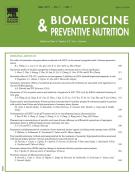Limonin – A citrus limonoid, establish anticancer potential by stabilizing lipid peroxidation and antioxidant status against N-nitrosodiethylamine induced experimental hepatocellular carcinoma - 15/06/13
 , Subbaraj Gowtham Kumar b, Srinivasan Perumal c, Rajendran Revathy c, Maruthaiveeran Periyasamy Balasubramaniam c
, Subbaraj Gowtham Kumar b, Srinivasan Perumal c, Rajendran Revathy c, Maruthaiveeran Periyasamy Balasubramaniam cAbstract |
Hepatocellular carcinoma (HCC) is the most common category of liver cancer, representing 83% of all cases. The intention of the present investigation was designed to explore the defensive efficiency of limonin against N-nitrosodiethylamine (DEN, 200mg/kg) induced phenobarbital promoted experimental hepatocellular carcinoma in male Wistar albino rats. Hepato carcinonogen DEN-treated experimental rats showed an elevated level of HCC marker enzyme alpha-fetoprotein, enhanced lipid peroxidation due to oxidative stress and free radical formation. In parallel, there was a drastic decline in the level of antioxidant enzymes due to the induction of DEN in Group II animals. Treatment with limonin, due to its pharmacological and antioxidant potential enhanced marker enzyme (AFP), lipid peroxidation and diminished antioxidant status was brought back near standard level. In addition, histopathological analysis was also carried out to mark the pathological alterations. In Group II animals, severe lesions and cirrhosis of the liver cells were noted. Limonin administration establishes its anticancer activity by totally refurbishing the smashed hepatocytes in Group III animals. Our study strongly put forward that limonin has excellent antioxidant and therapeutic property against DEN-induced hepatocarcinogenesis by suppressing LPO and oxidative stress mediated free radicals generation and through modulating antioxidants defense mechanism.
Le texte complet de cet article est disponible en PDF.Keywords : Hepatocellular carcinoma (HCC), Primary hepatic carcinoma, Limonin, N-Nitrosodiethylamine, Antioxidants, Lipid peroxidation (LPO)
Plan
Vol 3 - N° 2
P. 165-171 - avril 2013 Retour au numéroBienvenue sur EM-consulte, la référence des professionnels de santé.
L’accès au texte intégral de cet article nécessite un abonnement.
Déjà abonné à cette revue ?

